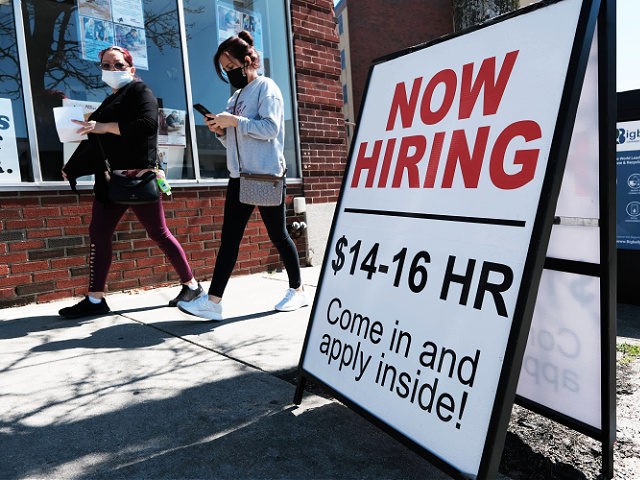Labor shortages are forcing up wages at small businesses nationwide, according to the monthly jobs report by the National Federation of Independent Business (NFIB).
The August 5 report comes as many Democratic Party politicians applaud President Joe Biden’s deputies for admitting hundreds of thousands of foreign migrants who are eager to take U.S. jobs at lower wages than needed by American families.
“Owners are raising compensation to the highest levels in 48 years to attract needed employees,” said the NFIB’s chief economist, William Dunkelberg. His report summarized business reports for July, saying:
Ninety-three percent of those [business] owners hiring or trying to hire reported few or no “qualified” applicants for the positions they were trying to fill in July …
Seasonally adjusted, a net 38% reported raising compensation, down one point from June’s record high of 39%. A net 27% of owners plan to raise compensation in the next three months … a 48-year record high reading.
But the NFIB is not an accurate representation of the nation’s business sector.
Almost 75 percent of its member companies employ nine or fewer people, leaving the company owners with little ability to pay the higher wages that the largest companies can pay. And despite the NFIB report, there is scant evidence of wage gains in 2021 for many workers outside a few sectors, such as resorts and restaurants. Breitbart News reported July 16:
Median weekly earnings of the nation’s 113.6 million full-time wage and salary workers were $990 in the second quarter of 2021, the U.S. Bureau of Labor Statistics reported today. This was 1.2 percent lower than a year earlier.
But the NFIB’s recognition of the link between the supply, demand, and the price of labor helps to refute the persistent claims by pro-migration advocates — including many business groups and investors — that the imported supply of labor does little or no harm to American wages. Breitbart News has extensively tracked that corporate denial, which is parroted by pro-migration activists in the United States and in the United Kingdom.
But the NFIB’s supply-and-demand predicament was also recognized by the August 5 Wall Street Journal: “Operating almost like a law of physics, a labor shortage naturally and reliably motivates employers to increase the incentive for employees and potential employees to show up for work,” wrote James Freeman, the Wall Street Journal‘s assistant op-ed editor noted.
Meanwhile, President Joe Biden’s homeland security chief is opening many new doors and windows in the border that protects Americans’ ability to earn decent wages in their own national labor market.
For example, 700,000 migrants — including at least 500,000 job seekers — have crossed the Mexican border since January because of loose rules set by Alejandro Mayorkas, the secretary of the Department of Homeland Security.
Mayorkas is offering Venezuelan migrants work permits through the Temporary Protected Status (TPS) program if they meet a Setempber 2022 deadline. He has also offered TPS and work permits to 100,000 Haitians. He is expanding the U Visa program, which provides work permits and green cards to people who claim they are victims of crime.
The Department of Justice is also revising asylum rules so Mayorkas’s deputies can offer citizenship to migrants who claim their home-country governments do not protect them from spousal abuse or routine crime.
Unsurprisingly, wages grew faster in President Donald Trump’s low-migration economy. In September 2020, the U.S. Census Bureau reported:
Median household income was $68,703 in 2019, an increase of 6.8 percent from the 2018 median of $64,324 … Real median household incomes increased for all regions in 2019; 6.8 percent in the Northeast, 4.8 percent in the Midwest, 6.1 percent in the South, and 7.0 percent in the West.
Cuban-born Mayorkas is an immigration zealot who grew up, graduated, and worked in California as a prosecutor during the 1990s. His support for migration is backed up by business groups.
Overall, investors and business coalitions want to import more migrants — even impoverished, ill, aging, or criminal migrants — because the migrants spike consumer sales, boost rental rates, cut wages, minimize management hassles, and so raise profits and stock values. The migrants also serve as clients for Democrat-run welfare agencies, and eventually, as voters for Democratic candidates.
But migration damages ordinary Americans’ career opportunities, cuts their wages, raises their rents, curbs their productivity, shrinks their political clout, and fractures their open-minded, equality-promoting civic culture.
The economic extraction of valuable consumers, renters, and workers from poor countries also helps move wealth — and social status — from heartland red states to the coastal blue states. The extraction policy also helps move wealth and status from GOP rural districts to Democrat cities within each state.
In general, legal and illegal migration moves wealth from employees to employers, from families to investors, from young to old, from children to their parents, from homebuyers to investors, from technology to stoop labor.

COMMENTS
Please let us know if you're having issues with commenting.